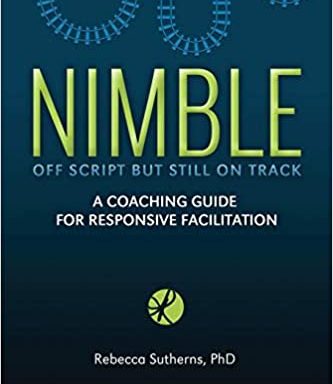#SHIFTsauce Recommended Reading
The most impressive facilitators always make it seem effortless. But nothing could be further from the truth.
If there’s one thing to be learned from Nimble: Off Script but Still on Track, Rebecca Sutherns’ Coaching Guide for Responsive Facilitation, it’s that masterful facilitation requires preparation, mental agility and, yes, plenty of effort.
Nimble is a comprehensive, practical guide for anyone who gets called upon to facilitate, novices and seasoned professionals alike. It methodically explores each stage of facilitation — from preparation through to reflection afterwards — offering insights, strategies and tips for every step of the process.
What Rebecca does particularly well up front is define the role of the facilitator. Described as “the guardian of group process”, Sutherns reminds us that the facilitator is responsible for the achievement of an agreed upon purpose (ie. Staying “On Track”). In order to get there, she maintains that, despite thorough preparation, there will always be a need for flexibility and the ability to pivot on the fly (ie. Going “Off Script”).
“Masterful facilitation is actually invisible. Done well, people hardly notice facilitation — they’re just carried along, willingly and productively. They have found that sweet spot, where orchestration and improvisation offset each other beautifully.”
The book challenges the reader to reflect on their natural tendency to either over-script or under-prepare and offers advice on how to self-correct in order to strike the ideal balance.
Structured in a consistent, easy-to-follow, digestible format, Nimble provides clear, concise charts, synthesizing the theories explored in each chapter. Analysis is built on a framework incorporating the “4 P’s of Facilitation” — People, Purpose, Place and Process — at each of three key phases — in advance, in the room, and afterwards.
With the inclusion of structured tools such as a One Day Facilitation Plan, a Facilitation Planning Template and a Space Planning Checklist, the author makes clear that being nimble only comes after painstaking preparation. The book is peppered with tips, some intuitive, but worth a reminder — get enough sleep, do your homework to learn about the participants in advance of a session, and prepare for a dip in energy at a certain point in the day.
Central to the book’s premise is that, despite all good intentions, experience and forethought, facilitators must expect the unexpected. What sets the skilled facilitator apart is the ability to alter the script (or “hold it loosely”) in pursuit of the objectives, even if it means re-evaluating those objectives midstream. All this is to be done, in Rebecca’s words, while maintaining a “calm, helpful presence”.
“If things unfold differently than you anticipated, notice it and adjust with a sense of interest, learning and wonder rather than frustration or panic.”
In practical terms, Nimble provides an 18-point “Getting Unstuck” cheat sheet on what to do when a session derails, and step-by-step instructions on how to deal with challenging participants.
Finally, at the conclusion of the book, Rebecca emphasizes the need for reflection and a growth mindset.
“Our goal in becoming a nimble facilitator is to become a reflexive practitioner — to reflect on our experience and to apply what we have learned”.
Applying what we have learned from Nimble: Off Script but Still on Track will bring even the most experienced of us closer to the illusion of effortlessness facilitation.
Buy a copy of the book Nimble: Off Script but Still on Track.
Learn more about Rebecca’s work and download free resources at RebeccaSutherns.com.


